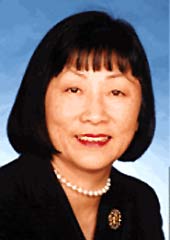
Julia Chang Bloch says "When I joined the Peace Corps, I learned to get the best from both my native Chinese and my adopted American cultures"
Keys to the Global Society
Technology is changing our world... Borders are disappearing as technological advances put us in touch with one another with increasing immediacy. We have become a global economy reliant on knowledge to thrive. The driving force of this new economy is education, increasingly international education.
In cyberspace, national boundaries and nationalities are largely immaterial. Multinational companies have become transnational. Their headquarters may be on two continents, administrative offices in one country, accounting in another, personnel in several. Products delivered to the US may have been produced in China, but the parts may be fabricated in Thailand, assembled in Hong Kong and shipped by Liberian freighter to Los Angeles.
As fast as the world is changing; so, America is diversifying. At current rates of immigration, minorities will make up almost half of the US population by the middle of the next century. The US Labor Department projects that 85 percent of America's net new workers will be non-male and non-Anglo by the year 2000. The future of America is in the massive demographic changes that are literally changing the face of our country.
In a world where borders are disappearing and diversity is the name of the game, international education is needed more than ever to prepare our children and ourselves to participate effectively in a world characterized by human diversity, cross-cultural interaction, dynamic change, and global interdependence. Can international education meet the challenges of the global knowledge economy? There is really no alternative. There is no substitute for international education to give students the knowledge, skills and attitudes for becoming successful global citizens.
Learning to value human diversity involves combining perspectives, respecting differences, and breaking down prejudices. This is not easy, as I know. As a first generation Chinese American, my undergraduate education at the University of California at Berkeley taught me to become an American. When I joined the Peace Corps, I learned to get the best from both my native Chinese and my adopted American cultures. And then, at graduate school at Harvard, a degree in regional studies helped me to relearn my ethnicity _ my Chinese heritage. My life has been a journey of overcoming boundaries, building bridges, and learning, through international education, the value of tolerance and respect for others who are different.
The lessons I learned as a student are clearly applicable in the global knowledge economy of today. People who succeed in this economy will be those who expand their thinking to embrace a global perspective. International education can develop the people needed to lead us in the 21st century.
For international education to succeed, I recommend the following:
# Sustain America's preeminent position as the destination of choice for international students.
# Convert Americans from their devout monolingualism by reinvigorating the teaching of foreign languages;
# Increase international study and professional development opportunities globally;
# Expand the flow of students, leaders, and experts to other countries; and
# Organize a coalition of government, academia and the corporate sector to create a public consensus for putting international education on the national agenda.
In meeting the challenges of the global knowledge economy, international education can become a defining, central feature of our educational system, not merely a peripheral specialty. In doing so, international education also becomes key to our global society. Julia Chang Bloch is currently a Visiting Professor of the Institute of International Relations and Executive Vice Chairman of the American Studies Center at Peking University. Until February 1998, she was President and CEO of the United States-Japan Foundation. Ambassador Bloch has had an extensive career in international affairs, culminating as U.S. Ambassador to the Kingdom of Nepal in 1989, becoming the first Asian American to hold such rank in U.S. history.
